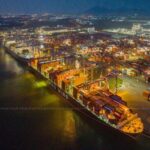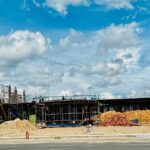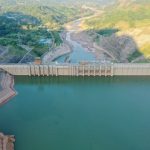At the seminar “Developing green logistics, adapting quickly and announcing FIATA World Congress 2025” held on the afternoon of July 9, Mr. Nguyen Quang Vinh, Vice President of the Vietnam Chamber of Commerce and Industry (VCCI), proposed that the government needs to develop a strategy and plan for logistics development by 2030, with a vision towards 2050, focusing on orienting the development of green logistics and environmentally friendly solutions.
GREEN FROM THOUGHT TO POLICY
According to figures provided at the seminar, the transport sector currently contributes 24% of global emissions. In the field of Vietnamese logistics, over 50% are transportation costs, so emissions are very high. According to the Vietnam Inland Waterways Administration, under the Ministry of Transport, transportation costs account for 60-70% of logistics activities.
Therefore, the greening of logistics is no longer a trend but has become a mandatory requirement for businesses. Mr. Nguyen Quang Vinh, Vice President of the Vietnam Chamber of Commerce and Industry (VCCI), stated that green supply chain management is closely linked to the governance of its links, including green design, production, operation, procurement, logistics, and waste management.

When these links are all “green,” enterprises will improve their production and operational capabilities while forming a green and sustainable ecosystem around them. This will create a competitive advantage and increase the ability of enterprises to adapt, withstand, and recover from market shocks.
According to Mr. Vinh, developing a green supply chain is not a future story but a necessity in the present, and it is not a choice but an obligation. Therefore, the government needs to develop a strategy and plan for logistics development by 2030, with a vision towards 2050, focusing on orienting the development of green logistics and environmentally friendly solutions.
In particular, the government needs to implement more policies to encourage and promote enterprises to move towards developing green logistics, especially small and medium-sized enterprises. This includes providing tax incentives, encouraging the use of alternative energy sources in road transport, promoting a shift in transport modes towards multimodal transport, and establishing carbon credits to protect and control greenhouse gas emissions.
Ms. Pham Thi Bich Hue, Chairman of Western Pacific Group (WPG), recommended that in addition to energy transition in transport, there should be a synchronized planning between manufacturers and logistics centers to optimize the transport route. Government regulation is the most important and clearest issue in this solution.
On the other hand, the government needs to continue supporting and promoting the development of renewable energy linked to green logistics. For example, one hectare of warehouse space can invest in 1 MW of renewable energy, equivalent to 20,000 green trees, and reduce approximately 1,400 tons of CO2 emissions.
Furthermore, the government should facilitate trade and simplify administrative procedures to maximize support for businesses during their digital and green transformation.
According to Mr. Stanley Lim, Secretary-General of the ASEAN Transport Federation, creating a sustainable and resilient economy is an urgent issue for each country. To achieve this, each government must take a leading role in all sectors and involve all relevant parties, not just through support but also through policies targeting specific industries, including logistics, manufacturing, and other service sectors.
“This is a matter of mindset and must be changed to adapt to global competition. Conversely, enterprises must enhance their capabilities and take greater responsibility in participating in sustainable logistics,” emphasized Mr. Stanley Lim.
WHAT ABOUT LOGISTICS ENTERPRISES?
Regarding Vietnamese logistics enterprises, where should they start their greening process when many large logistics enterprises worldwide, such as shipping companies and port businesses, have already embarked on a path to reducing greenhouse gas emissions and transitioning to green energy earlier than the committed timeline of countries?

Mr. Tran Thanh Hai, Deputy Director of the Import-Export Department (Ministry of Industry and Trade), suggested that the green transition for the logistics sector should focus on energy transformation for energy-using vehicles and equipment.
This remains a challenging equation for businesses. While small passenger transport vehicles have started using renewable energy, large freight transport vehicles have not yet made the transition.
According to Mr. Hai, enterprises can find ways to save energy during operations, such as using more efficient vehicles. At the same time, enterprises also need to improve efficiency and effectiveness in their work processes. This is a factor contributing to enhancing their ability to adapt quickly in the new context.
In addition to the role of the government, Mr. Stanley Lim, Secretary-General of the ASEAN Transport Federation, emphasized the importance of associations in training and enhancing the capabilities of enterprises in the industry. Each person in the industry must improve their abilities and skills to transform, take advantage of technology, reduce carbon emissions, cut operational costs, and ultimately enhance production capacity and increase revenue.
According to the VCCI Vice President, enterprises need to quickly build and supplement their strategies to align with the orientation of green and sustainable development in production and business activities.
For enterprises that have invested in developing green logistics and even set green logistics development goals in their strategies, it is necessary to regularly review the content of the strategy and the implementation status of green logistics development to make appropriate adjustments based on reality.
Additionally, they should take advantage of the support, encouragement, and incentives provided by the government and organizations to utilize logistics infrastructure efficiently, creating a competitive advantage in production, operation, and transportation. They should also promote the application of technology, develop new energy sources, and use environmentally friendly vehicles to promote clean and efficient development.
At the seminar, Mr. Le Duy Hiep, Chairman of the Vietnam Logistics Services Enterprises Association (VLA), announced that VLA had successfully won the bid to host the FIATA World Congress 2025, scheduled for October 2025. “Green Logistics” will be the main theme of this event.
FIATA WORLD CONGRESS 2025 is expected to attract more than 1,000 official delegates, including leaders of national logistics associations, international organizations, and, most notably, a gathering of leading logistics enterprises from almost all countries and territories worldwide.
This event presents a valuable opportunity for Vietnamese logistics and import-export enterprises to meet, exchange ideas, and collaborate with thousands of top logistics companies globally.
Vietnam’s Largest Deep-water Port Town is Set to Become a Thriving City with Investments from Korean Chaebols: Latest Project Involves Nearly 10 Trillion VND for Fuel
Previously, this chaebol has invested $3.5 billion in projects in various major cities such as Hanoi, Ho Chi Minh City, Dong Nai, and Ba Ria – Vung Tau.
Sharp Decline in Consumption, Warning of Very Low Water Levels in Hydropower Reservoirs
The Ministry of Industry and Trade’s Electricity Regulatory Authority has announced that electricity consumption during the Lunar New Year holiday is significantly low nationwide. In light of the low water levels in the hydropower reservoirs in the northern region, coal-fired and renewable energy power plants have been maximally utilized.
Advantages of Producing Green Hydrogen from Offshore Wind
In order for clean hydrogen to develop and thrive in Vietnam, it is necessary to implement supportive policies from the Government to ensure the competitiveness of clean hydrogen sources.
















